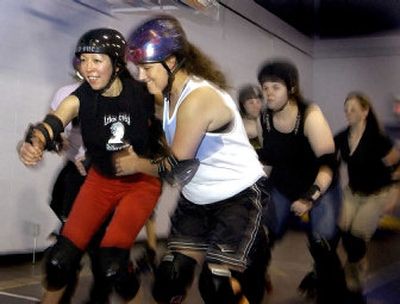Roll playing

Stacie Ellis has a baby to feed and some butt to kick.
It’s lunchtime on a sunny May day, and Ellis’ 9-month-old daughter is ready for a jar of Gerber peach cobbler.
Ellis, 35, wears a form-fitting Lilac City Rollergirls T-shirt and a denim miniskirt. She’s got on black roller skates with blue wheels. Elbow pads. Knee pads.
And she’s all fired up for some full-contact musical chairs with the skateboarders who happen to be in the quad at Spokane Falls Community College.
But first Ellis, founder of the fledgling Lilac City Rollergirls and also the mom of a 16-year-old son, gets a couple spoonfuls of peaches into Lily.
“Then we can show these boys what we’re made of,” she says. “And it ain’t sugar and spice.”
Jane’s Addiction plays for a few seconds and stops. And, one by one, the skateboarders lose their folding chairs. Ellis wrestles fellow rollergirl Serina Ibarra (known on the track as “Princess Pop-her”) to the ground before claiming a seat. There’s just one chair left for Ellis and the last skateboarder. It’s close, but the skateboarder wins.
“Is Mom weird?” Ellis says in a singsong voice as she skates back to Lily waiting in her stroller.
“If I wasn’t wearing a skirt, I tell you,” she says, as she goes back to spoon-feeding peaches.
Ellis (who skates under the name “El Gato”) dreamed up the Lilac City Rollergirls early this year. Why shouldn’t Spokane have an all-female roller derby league, she thought.
“I’m really tired of people moving to Seattle, moving to Portland,” she says. “I think there should be more hip things going on here.”
Plus, she says, all that skating “helped drop the baby weight.”
The Lilac City Rollergirls are part of a new generation of roller derby competitors.
The Women’s Flat Track Derby Association, which was formed in 2004, currently has 30 member leagues. Players say the game is now based more on athletics than the theatrical spectacle of old.
“The fights and all the action on the track is real,” WFTDA spokeswoman “Ginger Snap” of the Gotham Girls Roller Derby league says via e-mail. “Nothing is scripted – nothing fixed. … You aren’t used to seeing women fight in our society. Therefore people assume that two chicks fighting must be fake.”
The Lilac City Rollergirls have the battle scars to prove it. There’ve been more bruises than anybody can count, plenty of sore muscles and a mild concussion or two.
“You’ve got to be tough,” Ellis says. “You can’t be afraid to get hurt.”
Roller derby takes speed and strength and agility. But you don’t have to be superjock to do it, players say. You’ll see women of all shapes and sizes out on the track – and that’s part of the allure for the skaters.
“These girls are the girls that just didn’t quite fit in,” Ellis says. “They were the ones that got cut from sports.”
It will be a while before the Lilac City Rollergirls are bumping elbows with Portland’s Rose City Rollers or Seattle’s Rat City Rollergirls in sanctioned competitions.
To skate in Women’s Flat Track Derby Association bouts, leagues need 40 members. Right now, the Lilac City Rollergirls league hovers around a dozen active participants.
They meet weekly at the YWCA to practice and compete in minibouts. And they’ve gone full-throttle on recruitment, appearing at just about any public event and venue that will have them. (That’s why they were playing musical chairs at SFCC recently. And why they’ve skated at O’Doherty’s. And ArtFest. And why you’ll likely see them out at Hoopfest, too.)
“We just need some more girls,” Ibarra says.
At 23, Kelli Garland is one of the youngest – and newest – members of the team.
Garland, a preschool teacher, lost her husband, Jesse, to leukemia late last year. The two had known each other since high school and got married at Holy Family Hospital in February 2005.
She was looking for an activity to take up some of her time and keep her mind on a more positive track, she says.
“This is a totally empowering thing,” Garland says before practice earlier this month at the YWCA.
And so, she straps on her black helmet, puts on her pads and faces her fears.
“I’m always nervous before I do this,” she says before taking a puff on her asthma inhaler. “I have some catching up to do with these girls.”
Most of the other skaters have taken on names to match their personalities on the track. There’s Crazy Train. And Rainbow Spite.But Garland’s still working on her name.
“I feel like I need to get intimidating before I can be intimidating,” she says.
The other skaters are faster, more nimble. But Garland presses on, concentrating on staying upright and not getting toppled.
The roar of the roller skaters on the rubberized floor sounds like little jet engines. The pack whirrs by so fast it’ll cross your eyes.
“You’ve got to plan on looking like an idiot, on eating some floor,” Garland says. “It always goes fine. I just get nervous beforehand.”